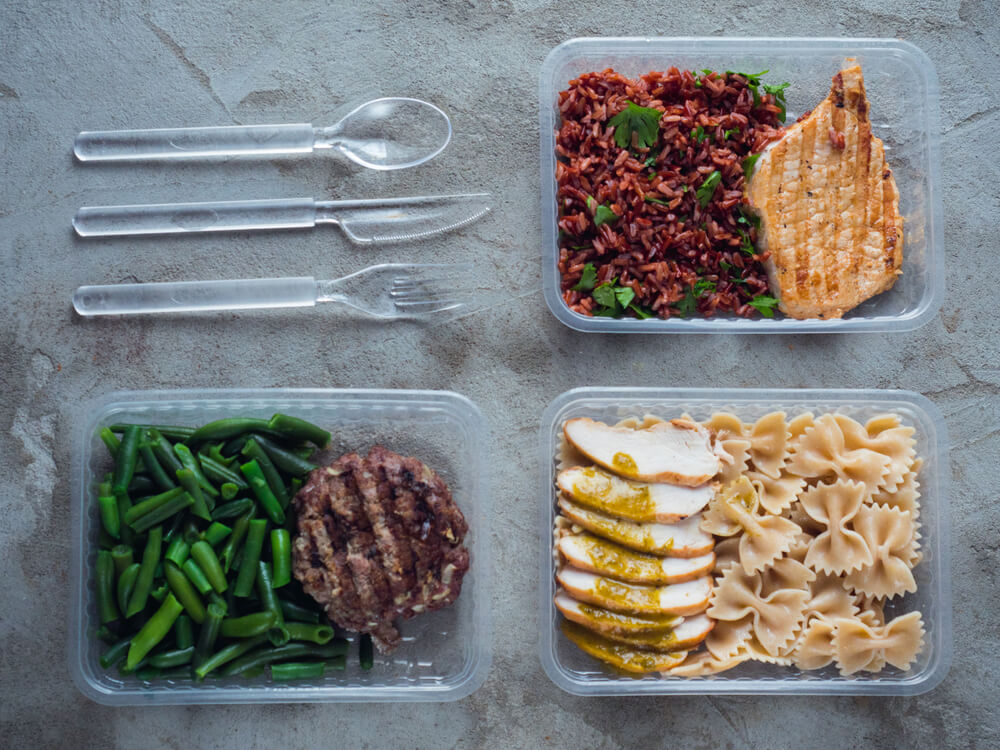
Bodybuilding can change the body rapidly—changing our schedules along with it.
When it comes to strength-training, timing is everything. After all, our bodies need to synthesize food into muscle. Whether you’re new to bodybuilding, seek a new exercise regimen or simply want to bulk up more efficiently, balancing your bodybuilding meal plan and gym schedule can redefine your progress.
The Path To A Successful Bodybuilding Meal Plan and Schedule
Your Sharpest Tool: A Sharp Meal Plan

So, what makes meal planning so important to building muscle?
They say eating once every three to four hours is ideal for building mass—but why so?
Truth be told, a variety of meal plans exist to meet a variety of goals. Depending on your own, the meal plan you create may differ wildly from common gym-goer diets.
The secret to building muscle mass extends well beyond our mealtimes themselves: It’s more about what we eat—rather than when we eat. This said, it’s much easier to fulfill our dietary needs when we plan ahead.
This is doubly true if we want to stay slim while bulking up. Some templates certainly make healthier plates than others—especially when it comes to keeping cravings at bay while keeping healthy selections within an arm’s reach at all times.
So get ready to stock your fridge, double-check your pantry and progressively overload your gym sessions by overhauling your meal plan: We’re about to optimize your gym schedule for food.
Muscle-Building Basics: What Should We Eat?

Because the contents of our meals matter the most, we’ll need to create a meal schedule based upon proper nutrition. Even though bodybuilding goals differ from person to person, their foundations tend to be consistent.
Even Olympic lifters and fitness novices need to achieve the same dietary baseline to nurture muscle growth—so every well-balanced meal needs to contain a few components.
Protein
If there’s any nutritional cornerstone capable of being a foundation in and of itself, it’s protein—and plenty of it. Protein is so important that we should even base our entire meal plan around it. In general, try to consume protein every couple of hours. Doing so will keep your body well-stocked for muscle synthesis.
We should try to eat the right types of protein, too. For starters, we need to meet the human body’s minimal protein needs for muscle building: Approximately 0.8 grams to one gram of protein per pound of body mass. Visualized in an example, this amount of protein would look like the following breakdowns:
- For a 150-lb person, 120 to 150 grams of protein per day.
- For a 120-lb person, 96 to 120 grams of protein per day.
- For a 180-lb person, 144 to 180 grams of protein per day.
This might seem like a lot of protein, but these numbers are relatively easy to meet when we’ve planned effectively. The daily protein requirements to avoidlosing muscle mass, fortunately, are a lot more lenient: We need only consume approximately 0.36 grams of protein per pound of bodyweight to keep our gains.
Carbohydrates
A lot of bodybuilders are total carboholics—and for good reason: Carbs are exercise fuel. This said, they’re also fuel for body fat, which makes it important to balance them effectively. See, carbs come in two forms: fast-acting starchy carbs, and non-starchy, long-term fuel carbs.
The non-starchy carbs tend to raise our blood sugar gradually, as opposed to rapidly. As such, they’ll be healthier all around when aiming for our bodybuilding goals—as they’ll provide the stable enrgy our bodies need to gain muscle efficiently.
Vitamins and Minerals
Our fruits and veggies play an important role, too.
Fortunately, they’re pretty easy to shop for. As a rule of thumb, aim for color variety. It’s a bit of a shopping list hack to do so, but it’s incredibly effective! This said, try to keep variety a priority. Here’s an example breakdown of fruits and veggies to shop for:
- Spinach
- Peppers
- Tomatoes
- Cucumbers
- Kale
- Green Beans
- Lemons
Where condiments and spices come in, we fortunately have a good few options available to keep our dishes not only nutritious—but tasty. Basil, nutritional yeast, salt, pepper, garlic and even balsamic vinaigrette can be part of our diet without worrying too much about fat gain—and they’re more than welcome in terms of bulking up.
Water
Oh yes—what we drink is just as important as what we eat. There are plenty of healthy drinks out there worthy of bodybuilding, but let’s focus on our hydration needs first and foremost. Even though protein shakes play an important role in muscle growth, we should consider them to be food, rather than a beverage.
Calorie-free beverages can keep our gym performance at its peak, making it important to avoid sugar-packed drinks that thicken our waistline. Interestingly enough, plain water can boost our body’s antioxidant properties.
Studies show that consuming hydrogen-rich water for more than two months can boost our antioxidant levels by as much as 39 percent!
What About Fats?
Fats and oils do serve a role in bodybuilding—and an important one. We should remember that starchy carbs tend to create bodyfat more than fats, themselves.
Even so, we should be careful when picking out our fat sources—because unhealthy fats, like trans fats, can easily do damage to our cholesterol levels while increasing our overall fat percentage.
So, what do good fat sources look like? With the following meal items, you can’t go wrong:
- Eggs
- Avocados
- Coconut oil
- Nuts
- Greek yogurt
Fat tends to be a misunderstood nutritional cornerstone in general—which is why your bodybuilding meal plan and gym schedule should make the most out of the fats it’s fueled from.
Fat helps us regulate our appetite, and it can even provide long-lasting energy better than carbohydrates do. Because healthy fats have very low amounts of insulin, they can even boost our immune systems while reducing the effects of aging.
They also aid the body’s absorption of vitamins A, D, E and K—which is never a bad thing.
The Plan: Our Dietary Mix
When putting these mealtime ingredients, we end up with a pretty solid bodybuilding meal plan and gym schedule target to look for. The following nutritional counts, based on a three-day-per-week gym session breakdown, should be more than effective for gaining muscle mass while reducing gained bodyfat:
- One gram of protein per pound of bodyweight: Approximately 25 to 30 grams per meal.
- 150 to 250 grams of carbohydrates per day: Approximately 30 grams per meal.
- 65 to 85 grams of fat per day: Approximately 20 grams per meal.
- Half of our body weight in ounces of water: Beverages consumed throughout the day.
Even though food plays an integral part in gaining muscle, the water we consume tends to be the magic ingredient that makes muscle synthesis happen. As such, try to spread out your water intake between approximately 12 glasses per day.
As a golden rule, always consume water if you’re thirsty—especially if you’re exercising.
The Schedule: Planning Your Workout Routine

If you want to build muscle while staying healthy, it’s best to divide your meals into three-meal-per-day segments. This said, those finding themselves a little energy-sapped may benefit from six meals per day.
In this type of diet, the above-mentioned dietary mix can simply be divided in half—constituting six “snack-sized” portions that add up to the same nutritional amounts.
To maximize muscle growth, we’ll need to make sure our bodies have adequate fuel for our workouts. Yup—you know what this means: Let’s “frontload” our carbohydrates early in the day, so as to maximize our lifting potential. The following schedule will work wonders for your fitness adventure:
- Meal One: Plenty of starchy carbs and protein.
- Meal Two: Fewer carbs, but plenty of vitamins and protein.
- Meal Three: Any remaining carbs, vitamins and protein.
In this meal split, we should treat Meal Three as our post-workout meal—or the growth-defining dish which gives our bodies growth fuel when they need it the most.
If you’re targeting a six-meal daily split, as opposed to a three-day split, Meal Three can become Meal Five and Meal Six. The most important thing, in any event, is to make sure you get protein during your post-workout meal in any event.
Additional Tips for Building Muscle
Remember the protein shakes mentioned earlier?
They’re incredibly effective as nighttime muscle-boosting drinks if they contain casein protein. Casein protein is digested slower than whey protein, making it excellent growth fuel while we’re sleeping.
It’s important to note that bodybuilding, in most approaches, does take time to foster results. With the above-mentioned meal plan, a 12-week resistance training regimen is ideal.
This doesn’t mean our bodybuilding meal plan and gym schedule can’t evolve, however: If you’ve found that your workouts aren’t able to gain intensity with a three-meal-per day split, or even a six-meal-per-day split, it’s okay to divide up the meals even more.
And, of course, there are those who enjoy lifting early in the day. If you’re part of this group, don’t worry: You can still maximize your muscle growth while eating healthy. Simply rotate your meals around to put your protein-heavy meal after your workout.
If possible, try to consume a carb-rich meal before exercising in general, as it’ll give you more energy to lift hefty weights.
Conclusion
At the end of the day, an effective meal plan is mostly about the ingredients. Meal timing is still important, but a number of studies show that it certainly isn’t everything. The human body is incredibly adaptable, and our dietary needs are just as flexible.
So just try your best, day in and day out, to meet your daily nutritional markers. If we train hard, pursue our goals with dedication and drink plenty of water—our muscle-building diet will be a winning one.
-Terry Asher
Terry Asher
Latest posts by Terry Asher (see all)
- Better Family – Product Review Liquid Daily 2 oz - Dec 16, 2024
- Post-Workout Recovery: The Key to Optimal Performance - Nov 25, 2024
- Pre-Workout Supplements – Everything You Need To Know - Nov 18, 2024











[…] This article was originally published by Gymjunkies.com. Read the original article here. […]
[…] Source link […]
[…] Source link […]
[…] Source link […]
Thank you for sharing! It would be great if you could give your readers (here me) a table of nutritional values of some popular foods.
[…] goals. Because, let us be honest, what do people truly want? They want to be on the fastest path to success they can, and they want the comfort of knowing that they are on the right […]
[…] Source […]